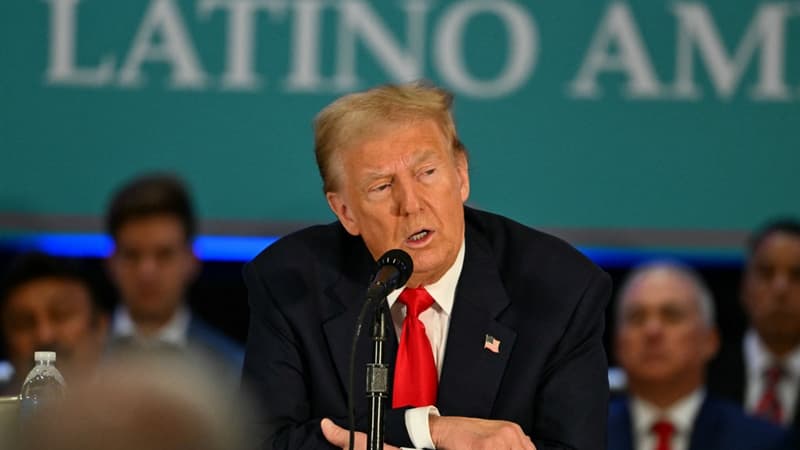A very difficult exit to overcome. On Sunday, October 27, at the opening of a Donald Trump rally at Madison Square Garden in New York, comedian Tony Hinchcliffe made a racist joke that caused controversy.
The latter compared Puerto Rico, many of whose natives reside in New York, to “a floating island of garbage in the middle of the ocean,” causing laughter in the room, but at the same time some embarrassment, according to BFMTV. reporter present at the scene.
A xenophobic attack that embarrasses one week before the elections, and while the vote of the Latino community runs the risk of having a significant weight in the polls. This electorate “may be the one that tips the balance,” Rodrigo Domínguez-Villegas, director of the Latino Data Hub at the University of California, Los Angeles, told AFP.
“It’s so crazy.”
The day after Donald Trump’s meeting and this racist outing, many Latino Republican voters expressed their indignation and say that they no longer want to vote for the man who already served as president between 2016 and 2020.
“It’s crazy that these guys say things like that. They consider us less than nothing,” Héctor Torres, an educator and Puerto Rican resident in Allentown, a town located in Pennsylvania, a state where the Latino vote is significant, explains to BFMTV. 600,000 votes, including 300,000 voters from Puerto Rico.
“If you are Puerto Rican and Latino and you vote for Trump, you are voting against your own interests,” he warns.
“It is very insulting to the Puerto Rican citizens of this country,” Elisa Covarrubias, originally from this Caribbean island that is a United States territory, laments to AFP.
“It’s horrible to be insulted like that in a meeting of someone who wants to be president,” he continues, speaking of a “big political mistake” against a community that “watches and listens.”
On the contrary, others, less frequent, are glad that the topic was discussed during the meeting. “But it’s true, Puerto Rico has a serious problem,” Luisa Melendy, also a Puerto Rican resident of Allentown and a fervent supporter of Donald Trump, told BFMTV. “I thank the comedian for talking about it. It gave visibility even though many people think it is negative,” says someone who calls Kamala Harris a “liar.”
The Latino electorate feels excluded
In general terms, the Latino electorate plays an important role and weighs heavily in key states such as Georgia, Arizona and Nevada. However, beyond some speeches and appearances in Spanish-speaking media, the candidates have made few efforts to attract this electorate, points out Rodrigo Domínguez-Villegas.
“There are few profiles, few political strategists of Latin origin and lack of investment,” insists the expert, who also deplores the tendency of the two parties to conceive of these diverse communities as a single monolithic block.
To fill this gap, activists from the NGO Galeo Impact Fund often invite Latino voters to eat tacos to talk about politics, like Jeanette Bowden. Also of Puerto Rican origin, this New York native already supports Kamala Harris, whom she considers more capable of reducing tensions and inequalities in the country.
Like her, around 56% of Latinos support Kamala Harris, compared to 37% who support Donald Trump, according to a recent New York Times survey, which highlights, however, that this margin has decreased compared to previous presidential elections. .
In recent weeks, activists from the Galeo Impact Fund have mobilized to encourage Hispanic communities to vote for Kamala Harris wherever the Democratic candidate’s campaign team has not gone, in Georgia (southeast), one of the states that will be decisive on November 5.
In a vote that promises to be the closest in modern United States history, more than 36 million Latinos will be able to vote, out of a total of around 244 million voters.
Source: BFM TV


